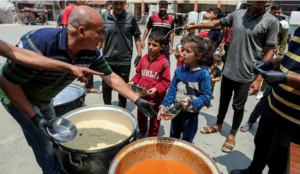On ‘very high alert’, World Central Kitchen fully resumes humanitarian operations in Gaza

Palestinians gather to receive meals cooked by World Central Kitchen after the charity resumed operations, at a school sheltering displaced people in Deir Al-Balah, May 2024
Allison Kaplan Sommer reports in Haaretz on 4 June 2024:
Two months after an Israeli airstrike killed seven World Central Kitchen workers in Gaza, causing the organization to suspend its humanitarian operations in the Strip, WCK says its work in the region has returned full force, with efforts ramped to address what one WCK official said were “famine” conditions in some parts of Gaza.
The organization, founded by celebrity chef Jose Andres, was devastated on April 1 when an Israeli strike killed seven of its volunteers and stopped operations in the enclave for just under a month. On April 28, they announced their efforts would resume.
At a press conference Tuesday, John Torpey, the WCK Middle East Activation Manager, said that WCK was providing food through their community kitchens model. Torpey said that 68 such kitchens were currently fully operational and that they hoped to set up four more over the coming weekend. All told, he said the organization has, since reopening, provided more than 3.5 million meals in Gaza.
With that, he said, the group is being exceedingly cautious as to where they are operating in order to protect their staff and volunteers. With the southern city of Rafah under what Torpey described as a state of “siege” from IDF forces, he said that “we’ve evacuated practically all of our community kitchens there” focusing their activities in the areas of Khan Yunis and Deir al-Balah.
“We were keeping a close eye on the [military] activities there, we ended up closing our Rafah kitchen down and moving a lot of our community kitchens relatively early,” he said. When “targeted strikes” began in Rafah “in fairly close proximity to some of our places, we really took security seriously and moved our people out of there as quickly as possible. So Rafah is mostly empty [of WCK activity] at the moment.”
In addition, Torpey stressed, since April 1, WCK has intensified coordination efforts and been “on very high alert to make sure that everything is checked and double-checked. Even if there’s a hint of an operation going on in an area where we’ll be, we’ll avoid that at all costs … I never want to have to go through that again.”
He said the Israelis had also stepped up their coordination efforts and “they’ve really tried to give us as much information as possible, erring on the side of caution. When Rafah was being evacuated, they were very quick to inform us to let us know that we needed to evacuate immediately. When things are happening, they’re very quick to call us and let us know what’s going on.”
Both sides, he said, were “redoubling our communication … there are a lot of phone calls and a lot of check-ins to make sure” that the events of April 1 “can never happen again.”
WCK is bringing aid in through a number of routes and from a number of sources, he added. Jordan has been “very very helpful” he said, both in facilitating air drops, and as a place to purchase oil, rice, flour and meat. He said the food is then loaded onto trucks at the Allenby Bridge crossing into Israel and driving directly to the Kerem Shalom crossing entering Gaza where it is offloaded, inspected by the Israeli authorities and reloaded onto trucks of Palestinians into Gaza to their community kitchens.
In addition, he said, they are unloading supplies at the Israeli port city of Ashdod and transporting them to Kerem Shalom, which he stressed, was “still the main gateway” to bring humanitarian aid into Gaza, now open, after being shut down following a Hamas rocket attack on May 5.
Torpey said that one route that was not being used was the new pier that the U.S. has been building to increase direct aid to Palestinians in Gaza. Regarding goods and supplies shipped in from Cyprus via boat, he said, “what we are probably going to do is move that into Ashdod Port and into Kerem Shalom.”
This article is reproduced in its entirety
